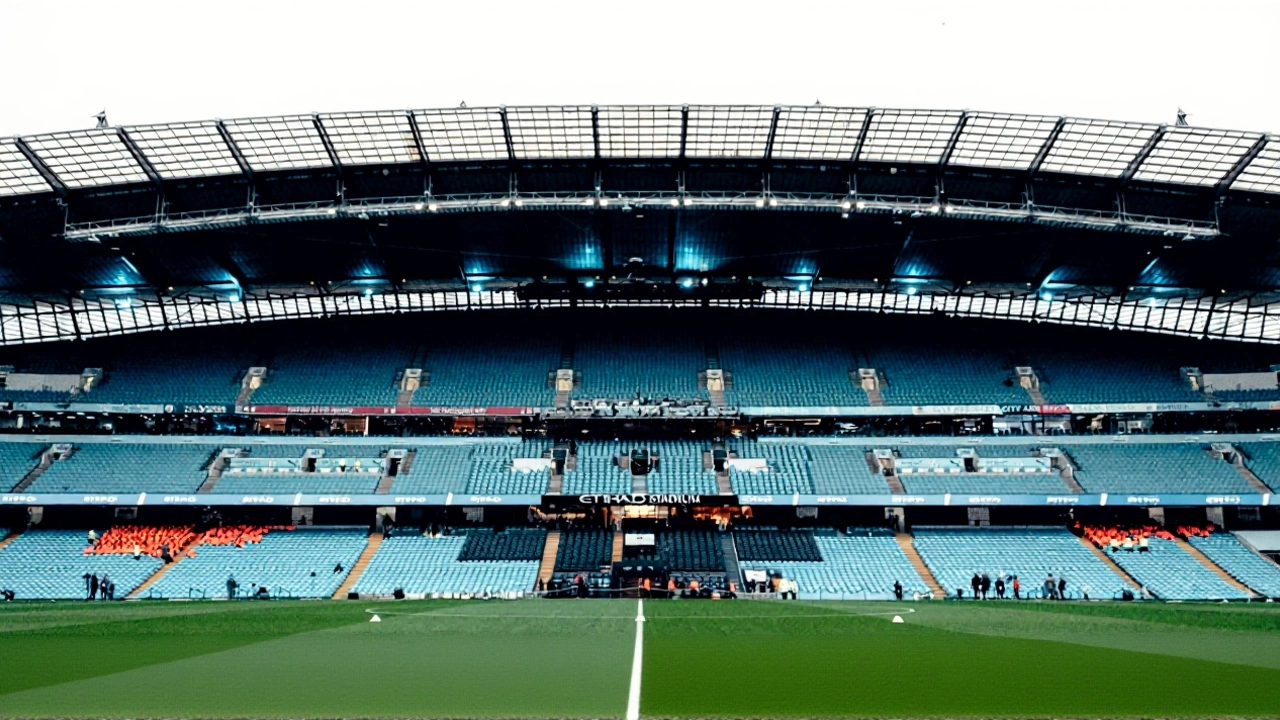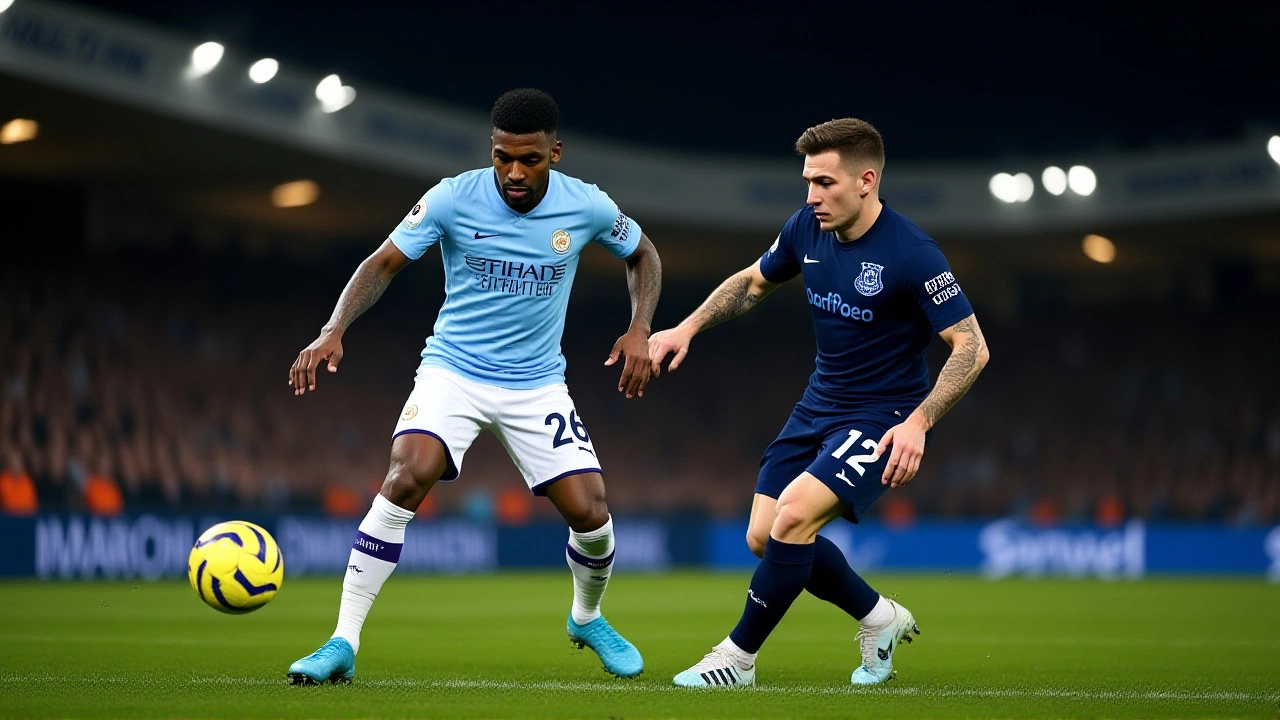When Riyad Mahrez, forward of Manchester City Football Club, stepped up for a spot‑kick against Everton Football Club on , the referee immediately blew his whistle.
The match – part of the 2021‑22 Premier League fixtureEtihad Stadium – was already tense, with both clubs jostling for crucial points near the top of the table.
What happened on the pitch
Mahrez approached the ball, took his run‑up, and struck it. But instead of a single clean contact, the ball glanced off his foot a second time before it rolled forward. In real‑time, the referee, assisted by his assistant, signalled a foul for a double‑touch penalty violation. No VAR review was needed; the breach was crystal clear.
Everton’s goalkeeper stayed on his line, expecting a routine conversion. When the referee’s whistle cut through the stadium, the roar turned to a collective gasp. The decision awarded Everton an indirect free‑kick from the penalty spot – a rare but perfectly legal outcome under Law 14 of the Laws of the Game.
Understanding Law 14 and the double‑touch rule
Law 14, maintained by the International Football Association Board (IFAB), states that a player must strike the ball forward with a single kicking motion and cannot touch it again until another player has made contact. The rule exists to prevent players from gaining an unfair advantage by “flicking” the ball for extra spin or power.
While most professionals never breach this rule in a live match, the penalty‑area setting creates a high‑pressure environment where a split‑second mis‑timing can lead to a double contact. In the Premier League, such infringements have been recorded in less than 0.2 % of all penalty attempts since VAR’s introduction in 2019‑20.
How the officials handled it
The on‑field referee, Mike Dean, did not consult the Video Assistant Referee (VAR) hub in Stockley Park because the offense was observable without replay. "When I saw the ball hit him twice, I knew it was a breach," Dean later told the press, adding that the decision was “in line with the law and the spirit of fair play.”
VAR officials, meanwhile, logged the incident but left the final call to Dean. This underscores a subtle shift in how technology supports – rather than replaces – the referee’s judgment on technical fouls.
Reactions from the clubs and manager
Manchester City’s manager, Pep Guardiola, was visibly upset but measured. "It’s disappointing because we felt the penalty should have stood, but the referee made his call. We’ll learn from it and stay focused on the next game," he said in the post‑match interview.
Everton’s captain, James Milner, praised the decision. "The law is clear, and the referee applied it correctly. It’s a reminder that every detail matters, especially in a tight league race," Milner remarked.
Mahrez, on the sidelines, joked, "I’ll practice my footwork more. You never know when you’ll need an extra touch – just not on a penalty!"

Why this rare call matters
- Penalty conversion rates in the Premier League hover around 78 %; a disallowed spot‑kick can swing two points.
- The decision came at a pivotal moment – City were three points behind Liverpool, and a win would have tightened the title chase.
- It highlights the continued relevance of the Laws of the Game in an era dominated by technology.
- For Mahrez, the incident adds a quirky footnote to his otherwise prolific career (over 90 Premier League goals).
Statistically, the odds of a double‑touch penalty being called are comparable to a goalkeeper scoring a goal – astonishingly low, yet the rulebook leaves no gray area.
Looking back: other double‑touch penalties
Only a handful of high‑profile cases exist. In 2018, Sunderland’s Jermain Defoe had a penalty rescinded for a double touch against Wolverhampton Wanderers. In 2020, a Europa League match saw a similar call against Bayer Leverkusen’s Raffael. Each instance sparked debate about referee interpretation, but none altered league outcomes as dramatically as City’s 2022 match.
These precedents reinforce that while rare, the rule is enforced consistently when evidence is clear – a principle that protects the integrity of the sport.
What’s next for City and Everton
Manchester City finished the season just one point ahead of Liverpool, clinching the title after a dramatic final‑day showdown. The disallowed penalty, though costly in the moment, proved not to derail their championship run.
Everton, meanwhile, fought relegation and survived by a narrow margin, later appointing a new head coach to address defensive frailties exposed in matches like the March 13 fixture.
Frequently Asked Questions
How does a double‑touch violation affect the outcome of a penalty?
The penalty is immediately disallowed, and the opposing team receives an indirect free‑kick from the penalty spot. No goal can be awarded, and the ball must be retaken only if the referee determines a procedural error.
Did VAR play any role in the Mahrez decision?
No. The infringement was obvious to the on‑field officials, so the referee blew the whistle straight away. VAR logged the incident but did not intervene, illustrating that not every penalty issue requires video review.
Who ultimately enforces Law 14 in the Premier League?
The match referee enforces Law 14, assisted by the referee’s assistants. The Professional Game Match Officials Limited (PGMOL) trains officials on these nuances, and IFAB’s rulebook provides the definitive guidance.
What impact did the disallowed penalty have on Manchester City’s title race?
City eventually won the 2021‑22 title by a single point. While the missed penalty cost them two potential points in that match, they compensated with wins later in the season, keeping the race tight until the final games.
Are double‑touch penalties common in elite football?
Extremely rare. Analyses of Premier League data since VAR’s adoption show fewer than one in five hundred penalties are ruled out for a double‑touch, making Mahrez’s case a notable anomaly.
